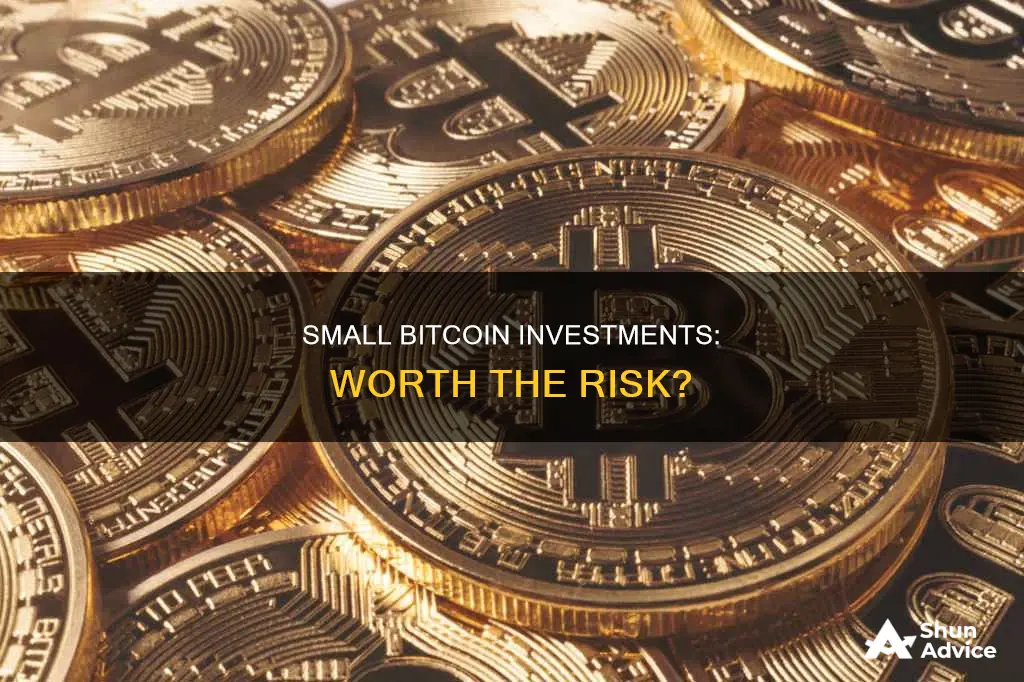
Investing a small amount of money into Bitcoin can be a good idea, especially if you are new to the world of cryptocurrency. While the current price of Bitcoin is in the tens of thousands, it is important to remember that Bitcoin is divisible into smaller units called Satoshis. This means that even if you only have $5 to invest, you can still purchase Bitcoin and potentially benefit from its long-term growth. However, it is crucial to consider the risks associated with investing in Bitcoin, such as market volatility and lack of regulation, and to do your own research before making any investment decisions.
| Characteristics | Values |
|---|---|
| Amount | $5 |
| Worthwhile Investment | Yes |
| Common Misconception | High Price |
| Affordability | Accessible to Investors with Varying Budgets |
| Network and Exchange Fees | $1.99 to $2.99 |
| Volatility | High |
| Regulation | Lack of Regulation |
| Risk | Potential to Lose Entire Investment |
What You'll Learn

Bitcoin divisibility and its impact on accessibility
Bitcoin divisibility is essential for its adoption and everyday usage as a currency. Divisibility is a property of money, commodities, fiat currencies, or cryptocurrencies that makes something of value exchangeable. For money to be exchanged for goods of varying values, it must be broken down into smaller units.
Bitcoin can be divided into units as small as 0.00000001 BTC, also known as a "Satoshi," named after its pseudonymous creator, Satoshi Nakamoto. One Bitcoin is equivalent to 100 million Satoshis, allowing individuals to invest in smaller, more affordable fractions. This divisibility lowers the barrier to entry for investors with varying budgets.
The divisibility of Bitcoin also has implications for transaction fees. Fees associated with Bitcoin transactions are based on the size of the transaction and network congestion. Microtransactions in Satoshis may result in lower fees compared to larger Bitcoin transactions because they are smaller in size. Additionally, transaction fees are optional, serving as tips for miners, and Satoshis transactions may not always require a fee, especially if the network is not congested.
The extreme divisibility of Bitcoin, up to eight decimal points, facilitates its scarcity. Even as the price of Bitcoin increases over time, users with tiny fractions of a single Bitcoin can still participate in everyday transactions. This is in contrast to traditional currencies, where a high price without divisibility would prevent its usage in most transactions.
Furthermore, Bitcoin's divisibility enables micro cross-border payments, which are typically unfeasible with traditional payment solutions due to minimum amount requirements and fees.
In conclusion, Bitcoin's divisibility increases its accessibility by allowing individuals to invest smaller amounts, facilitating everyday transactions, and enabling micro cross-border payments.
Why Men Should Invest in Bitcoin Now
You may want to see also

Network and exchange fees
When considering investing $5 in Bitcoin, it is important to account for network and exchange fees. These fees can vary depending on the platform used to purchase Bitcoin, the payment method, and the size of the transaction.
For example, Coinbase, one of the most popular cryptocurrency exchanges, charges a flat fee for transactions up to $200. For transactions of $10 or lower, the fee is $0.99, while it increases to $1.49 for transactions between $10 and $25, $1.99 for transactions between $25 and $50, and $2.99 for transactions between $50 and $200. Transactions above $200 are charged a percentage-based fee instead of a flat fee. Additionally, Coinbase charges a spread-based fee of 0.50%, and using a bank account or USD Wallet incurs an additional 1.49% fee, while using a credit or debit card adds a 3.99% fee.
Other platforms may have different fee structures. For instance, Binance, the largest cryptocurrency trading platform globally, bases its transaction fees on the user's trading volume over the past 30 days and the number of Binance Coins (BNB) held. Similarly, Kraken and Binance are known for their more modest trading fees compared to Coinbase.
It is worth noting that some platforms, such as Robinhood, eToro, and BlockFi, offer fee-free services, significantly reducing overall trading expenses.
When purchasing Bitcoin with a small amount like $5, it is essential to consider these fees as they can significantly impact the overall cost and profitability of the investment. Therefore, it is recommended to look for low-fee exchanges or deposit methods to make the investment worthwhile.
Litecoin's Long-Term Investment Prospects: Worth the Risk?
You may want to see also

Volatility of the Bitcoin market
The Bitcoin market is extremely volatile, with prices fluctuating wildly from day to day and even hour to hour. This volatility can be beneficial for short-term traders looking to make quick profits but poses a significant risk for long-term investors. If you invest a small amount, such as $5, in Bitcoin and the price suddenly drops, you could lose a large portion of your investment.
There are several factors contributing to Bitcoin's volatile nature:
- Supply and Demand: Like most commodities, the price of Bitcoin is heavily influenced by supply and demand. As Bitcoin is designed with a limited supply of 21 million coins, the closer the circulating supply gets to this limit, the higher the prices are likely to climb.
- Investor Actions: The actions of investors, particularly large investors known as "Bitcoin whales," can significantly impact the market. For example, if whales were to suddenly liquidate their Bitcoin holdings, it could trigger panic selling and cause prices to plummet.
- Media and Influencers: Media outlets, influencers, industry moguls, and cryptocurrency fans can create investor concerns and hype, leading to price fluctuations.
- Fear and Greed: Investor fear of missing out on big upswings or falling victim to large downswings can result in panic buying or selling, influencing demand and prices.
- Utility Beliefs: Varying beliefs about Bitcoin's utility as a store of value and a method of value transfer also play a role in its volatility. Some investors view Bitcoin as a hedge against inflation, while others are sceptical of its long-term value.
- Regulations: Rumours and changes in government regulations and policies towards cryptocurrency can also impact Bitcoin's price. For example, China's ban on cryptocurrency transactions in 2021 caused a significant drop in Bitcoin's price.
- Market Maturity: As Bitcoin is still a relatively new asset class, it is undergoing a price discovery phase. Over time, as the market matures and stabilizes, volatility is expected to decline.
While Bitcoin's volatility can be a concern for investors, it's important to note that it can also present opportunities. Historically, investors have been well-compensated for Bitcoin's volatility, and low volatility periods have often been followed by steep price rises. Additionally, Bitcoin's volatility has been declining, and it is now less volatile than many large and popular securities.
Strategic Bitcoin Investment: Long-Term Commitment
You may want to see also

Lack of regulation in the Bitcoin market
Investing in Bitcoin comes with a number of risks, one of which is the lack of regulation in the Bitcoin market. Unlike stocks or bonds, there is no governing body that oversees Bitcoin transactions. This can make it difficult for investors to know whether their investment is safe and can leave them vulnerable to fraud or other illegal activities.
The lack of regulation in the Bitcoin market is due in part to the nature of cryptocurrencies, which are freewheeling and not beholden to country borders or specific agencies within a government. This presents a challenge to policymakers who are used to dealing with clear-cut definitions for assets.
In the United States, for example, the IRS treats cryptocurrency as property, while the CFTC considers it a commodity. This discrepancy in classification makes it difficult to regulate Bitcoin effectively.
The lack of consistent regulation also extends beyond the US. Cryptocurrency regulation varies significantly across the globe, with some countries, like China, imposing strict bans on exchanges, trading, and crypto mining, while others, like Japan, recognize and regulate cryptocurrency as property.
The good news is that there have been recent efforts to address the lack of regulation in the Bitcoin market. In 2023, the European Union adopted the world's first comprehensive cryptocurrency regulations, known as the Markets in Crypto-Assets Regulation (MiCA). This legislation provides a framework for regulating cryptocurrency assets and transactions within the EU.
Additionally, organizations like the International Organization of Securities Commissions have laid out recommendations for global rules on managing crypto and digital assets. There is a growing recognition among governments and international organizations that consistent and effective regulation of the cryptocurrency market is necessary to protect consumers, combat illegal activity, and maintain the stability of the global financial system.
Bitcoin Investment: Safe or Risky Bet?
You may want to see also

Possibility of losing the entire investment
While investing a small amount like $5 in Bitcoin may seem like a low-risk endeavour, there is a possibility that you could lose your entire investment.
Bitcoin is a highly volatile asset, with prices fluctuating significantly over short periods. This volatility can be advantageous for short-term traders aiming to profit from rapid price changes, but it poses a significant risk for long-term investors. If the Bitcoin price suddenly drops, your $5 investment could lose value or even be cut in half.
For instance, an investment of $50 in Bitcoin lost 14% of its value in a week, and after three weeks, it was down 28.11%. This highlights the potential for rapid and substantial losses, even with a small initial investment.
Additionally, the lack of regulation in the Bitcoin market is another concern. Unlike stocks or bonds, there is no governing body overseeing Bitcoin transactions, which can make it challenging to assess the safety of your investment and leave you vulnerable to fraud or other financial risks.
Therefore, despite the potential for gains, it is crucial to recognise the possibility of losing your entire $5 investment in Bitcoin due to its volatile nature and the unregulated market.
Strategizing Bitcoin Investments: How Often to Invest?
You may want to see also
Frequently asked questions
Yes, investing in Bitcoin for $5 or any other small amount is a good idea. It can be a worthwhile investment, and you can still buy Bitcoin for as little as $5.
Investing small amounts in Bitcoin can be beneficial as it allows individuals to enter the market at a comfortable investment level. It also helps to overcome the fear of missing out (FOMO) that many newcomers to cryptocurrency experience due to Bitcoin's high market price.
Yes, investing in Bitcoin, even in small amounts, carries risks. The Bitcoin market is highly volatile, unregulated, and susceptible to fraud or illegal activities. There is also a possibility of losing your entire investment due to the market's extreme volatility.
To maximise the benefits, consider using a dollar-cost averaging strategy, where you invest a fixed amount regularly. This helps to mitigate the impact of market volatility. Additionally, look for low-fee exchanges or deposit methods to make your investment more profitable.
Some popular alternatives to Bitcoin include Ethereum, Ripple, Litecoin, and Bitcoin Cash. Each cryptocurrency has unique features and potential for growth, so be sure to research and diversify your investments.







